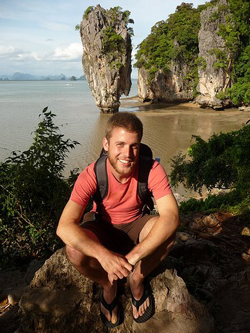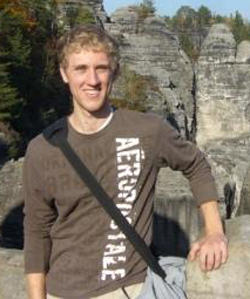Ethan, '06
 I have been accepted to Columbia University’s School of International and Public Affairs, where I will be working towards a M.A. in International Relations and Public Policy at Columbia and the Hertie School of Global Governance in Berlin, focusing on possible implementations in the US of European models in public policy.
I have been accepted to Columbia University’s School of International and Public Affairs, where I will be working towards a M.A. in International Relations and Public Policy at Columbia and the Hertie School of Global Governance in Berlin, focusing on possible implementations in the US of European models in public policy.
I graduated from Wheaton in 2006 with a double major in German and History. Although concentrations were not officially declared, I considered my academic focus to center on post-trauma, European (mainly German) literature and historiography, whether that be post 1848, 1945 or 1989.
During my senior year, I applied to two post-graduate programs, Middlebury College’s School of German and the Fulbright Commission’s Teaching Assistantship Program. I had the fortune and blessing to be accepted to both, in addition to being awarded a Max Kade Foundation Scholarship for Middlebury’s summer session.
For my MA from Middlebury, I completed my one summer in Middlebury and then took a year off as an active student to complete my Fulbright assistantship in Düsseldorf, Germany.
During that year, I gave English lessons at a German Gymnasium for twelve hours per week, sponsored the extra-curricular English film club and helped organize a ski trip to Switzerland. Fulbright is an excellent program that provides not only guidance in the immersion process in one’s host country but also flexibility. I was able to visit a German elementary school twice a week, getting a more complete picture of the German education system. In addition, I had the extra time to enroll in two MA-level courses per semester at Heinrich-Heine-Universität zu Düsseldorf, both of which I was able to apply to my Middlebury degree.
Upon completion of my Fulbright assignment in Düsseldorf, I spent a summer with my family in Florida before moving to Berlin to continue my Masters. One of my first tasks was defining a concentration within the bounds of “German Studies.” Considering what was academically feasible in a year and advantageous to my knowledge already acquired, I concluded with “Germany as a Member of the European Union.” I examined the most defining social, political and economic phenomena affecting Germany in this supranational organization.
Also during this year, I had the opportunity to work in an editorial capacity at the Atlantische Initiative e.V., also known as the Atlantic Community (www.atlantic-community.org). I supported a website committed as a user-generated, open think tank for policy and economy issues facing today’s transatlantic partnerships. I was able to publish my own opinion editorials on a variety of topics and report on ministerial meetings at the Bundestag (Germany’s Parliament).
After submitting my nine research papers for final review and passing a comprehensive examination on the intricacies of the European Union political structure (whew!) I moved back to the states for a couple of weeks before setting off once again, this time for Asia on a four-month, solo-backpacking journey that took me from Tokyo to New Delhi.
Ben, '08
 I visited Germany for the first time as a 13-year-old on a short-term mission trip with my church, and I fell in love with the country. That trip and a similar one that followed one-and-a-half years later ranked as the high points of my life until Wheaton in Germany 2007. Still, I didn’t start at Wheaton as a German major. I took German Conversation in order to fulfill the requirements for my International Relations major. As I reshuffled my major/minor plans, I eventually added German as a minor. When it became clear that I would be able to afford Wheaton in Germany, I made it a second major. I graduated with an International Relations/German double major, which I found to work well together.
I visited Germany for the first time as a 13-year-old on a short-term mission trip with my church, and I fell in love with the country. That trip and a similar one that followed one-and-a-half years later ranked as the high points of my life until Wheaton in Germany 2007. Still, I didn’t start at Wheaton as a German major. I took German Conversation in order to fulfill the requirements for my International Relations major. As I reshuffled my major/minor plans, I eventually added German as a minor. When it became clear that I would be able to afford Wheaton in Germany, I made it a second major. I graduated with an International Relations/German double major, which I found to work well together.
I am currently living in Loiz, Germany as an English Teaching Assistant (ETA) in the Fulbright grant program. I assist the English faculty at a German Gymnasium by teaching lessons, giving presentations about America or my life, helping students with exercises and assignments, offering tutoring sessions, leading a book club, and heading up a video exchange between a small group of students at our school and two American schools. I highly recommend the Fulbright ETA program for anyone interested in Germany and teaching.
After my Junior year at Wheaton, I interned for six weeks in the Berlin office of a member of the German Bundestag. I sorted mail, answered the phone, drafted press releases (which were never used, but made for a good experience), went to presentations, and attended workgroup, committee, and plenary meetings of the German parliament.
German language and culture is everyday life for me. Some people look at the high percentage of Germans who speak at least a little English and ask why they need to learn German. Sometimes I stop to think how much I would miss if I depended on my German friends’ knowledge of English all the time. The fact is, Germany is a German-speaking country and the language of operation is German. I use German to talk with my host mom about her family, with teachers at the school to plan upcoming lessons, with my German “sister” to explain why the Civil War was the bloodiest war in American history, and with non-believing attendees of a church service to explain who I believe Jesus is.
Mark, '05
 I was a International Relations/German double major at Wheaton. In order to complete the IR degree, I served an internship in the Public Affairs department of the British Consulate General in Chicago. That was in the summer of '05; in early '06 I was hired full-time by the same department as an 'Assistant Public Affairs Officer.' I stayed in that position until moving to Indonesia.
I was a International Relations/German double major at Wheaton. In order to complete the IR degree, I served an internship in the Public Affairs department of the British Consulate General in Chicago. That was in the summer of '05; in early '06 I was hired full-time by the same department as an 'Assistant Public Affairs Officer.' I stayed in that position until moving to Indonesia.
I'm currently living in Central Java, Indonesia, halfway through a one-year service assignment with the Mennonite Central Committee (the specific program is called SALT). I arrived here last summer, and will return to the States this summer. I live in a city called Kudus, where I teach English at a High School. In addition to that I participate in a Javanese church here in a somewhat official role. My position with MCC states that I am an 'Interfaith Bridge-building Intern' - a delightfully vague description of my activities in and around Kudus.
To put it simply: I am very curious about the possibilities/challenges of Muslim-Christian dialog, and living in Kudus for this year gives me a lot of insight into, and first-hand experience with, that particular subject. Christians here of course live as a minority amongst a strong Muslim majority (which is obviously the reverse of the situation in the States or even Germany and Austria... depending on how you define religious identity) - so it is interesting to see how that dialog develops in a place where the 'tables are turned' from the situation I am used to. Not sure what all that really means, what the implications are for my future work once I go home, but it's been a fascinating experience thus far.
I became a German major quite be accident, or God's grace, you could say! I started studying it my first year of high school only because French didn't fit in my schedule. I was intent on studying a foreign language all four years of high school. When I entered Wheaton as an International Relations major I picked German as my foreign language. As I accumulated credits it only made sense to at least minor in it. Eventually I decided to add it as a second major. Which I in no way regret: I still maintain that my German senior seminar was the best class I ever took at Wheaton. The content was terrific - the German works each paired with a different school of critical theory. And the small seminar format, frequently meeting for dinner at the Shaffers', only enhanced my learning/retention. Grappling with those theories really forced me to think, deeply, even about my Christian faith.
That was kind of frightening, but an ultimately good and necessary thing. And something I think every Wheaton student would benefit from. Some of the theories can lead to pessimism about the potential for ANY kind of communication between people, let alone the transmission of the Gospel message. But rather than wallowing there, the course enhanced my appreciation of language as a marvelous, mysterious, divine gift. To have wrestled with those difficult things, and then read that the Word was with God in the beginning... and that the Word became flesh and dwelt among us... Scripture becomes all the more profound. That's what I took away from the seminar.
As for how my current situation relates to my German major: having already studied a foreign language has definitely helped me as I now try to tackle Indonesian, and a bit of Javanese. I am familiar with the process of learning a new language, the techniques and methods that work for me, having already gone through this process in German. That certainly works to my advantage. Also, my study of German culture - specifically, its Turkish/Muslim minority - has informed my understanding of Muslim-Christian dialogue.
Maybe to put it more practically: having a German/International Relations major probably makes me more marketable. Even if my German studies and overseas experience didn't deal directly with the UK, those things enhanced my resume and demonstrated that I have been liberally/internationally educated.
